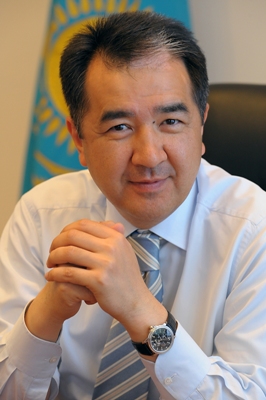Kazakhstan offers to boost business ties with Azerbaijan

By Aynur Jafarova
The trade turnover between Azerbaijan and Kazakhstan that makes up $300 million is very low and does not correspond to the level of economic relations between the two countries, according to Kazakh First Deputy Prime Minister Bakytzhan Sagintayev.
Sagintayev said Monday that Kazakhstan aims to establish contacts between companies of the two countries and to encourage them to make more investments.
"We want to give an impetus to the development of contacts among businessmen, especially those from the Caspian Sea region," Sagintayev said.
According to him, it is necessary to organize business contacts at the governmental level, as well as to raise these ties to a higher level.
"Currently, political relations are at a very high level, that is, everything has been done to foster developed business relationships; the governments' task is to create conditions for strengthening these relations," Sagintayev said.
When asked about the possibility of Kazakhstan's participation in the Trans-Caspian gas pipeline project, Sagintayev said that his country is currently considering more meeting its domestic gas demand, rather than its exports.
"Kazakhstan has no such volumes of gas as Azerbaijan, Russia or Turkmenistan. We are now thinking more about how to meet our domestic needs. Our northern and central regions are not supplied with gas. Today our task is to supply our country with gas," Sagintayev said.
The Trans-Caspian Gas Pipeline running around 300 kilometers is to be laid from the Turkmen coast of the Caspian Sea to Azerbaijan, where it will be linked to the Southern Gas Corridor.
Talks on the construction of the pipeline between Turkmenistan, the EU and other countries have been held since the late 1990s. The negotiation process intensified after the EU issued a mandate to start negotiations on the preparation of an agreement between the EU, Azerbaijan and Turkmenistan on the Trans-Caspian project in September 2011.
Oil flow via Azerbaijan's pipelines
However, Sagintayev said, Kazakhstan does not rule out the possibility of oil transportation via Azerbaijan's export pipelines, noting that this issue has been discussed for a long time and the negotiation process is underway.
Sagintayev stressed that oil transportation via Azerbaijan's pipelines depends on the oil production from the Kashagan offshore field. According to him, the volume of oil production in Kazakhstan is sharply increasing but the capacities of existing pipelines are not sufficient for transportation, therefore, Kazakhstan will have to transport the produced volume via new routes. The route through Azerbaijan is not ruled out and is among the possible routes, Sagintayev said.
According to him, the volume of oil transportation via railways also depends on the expected increase of oil production.
"The main issue to be determined is in which direction the oil will be transported," he said. "If the existing volumes of oil transportation via Azerbaijan's railway system are sufficient, we will keep them."
It was earlier reported that the production of first oil at the Kashagan offshore field has been postponed from March till June 2013.
The Kashagan field is being developed by the North Caspian Operating Company (NCOC) consortium.
NCOC Managing Director Pierre Offant earlier said that the first volumes of oil production at Kashagan will be 370,000 barrels per day while in the later stage this figure will rise to 450,000 bpd.
Recoverable oil reserves of Kashagan are estimated by NCOC at 11 billion barrels, whereas total geological raw material reserves stand at 35 billion barrels. It is believed to be the largest oil field in the world after Prudo Bay in Alaska.
The start of commercial production at Kashagan is expected by mid-2013. The first phase of the project envisions the volume of production at around 370,000 barrels of oil per day with a possible increase to 450,000 barrels. The second phase envisages increasing production to 375,000 bpd within at least three years.
Here we are to serve you with news right now. It does not cost much, but worth your attention.
Choose to support open, independent, quality journalism and subscribe on a monthly basis.
By subscribing to our online newspaper, you can have full digital access to all news, analysis, and much more.
You can also follow AzerNEWS on Twitter @AzerNewsAz or Facebook @AzerNewsNewspaper
Thank you!
